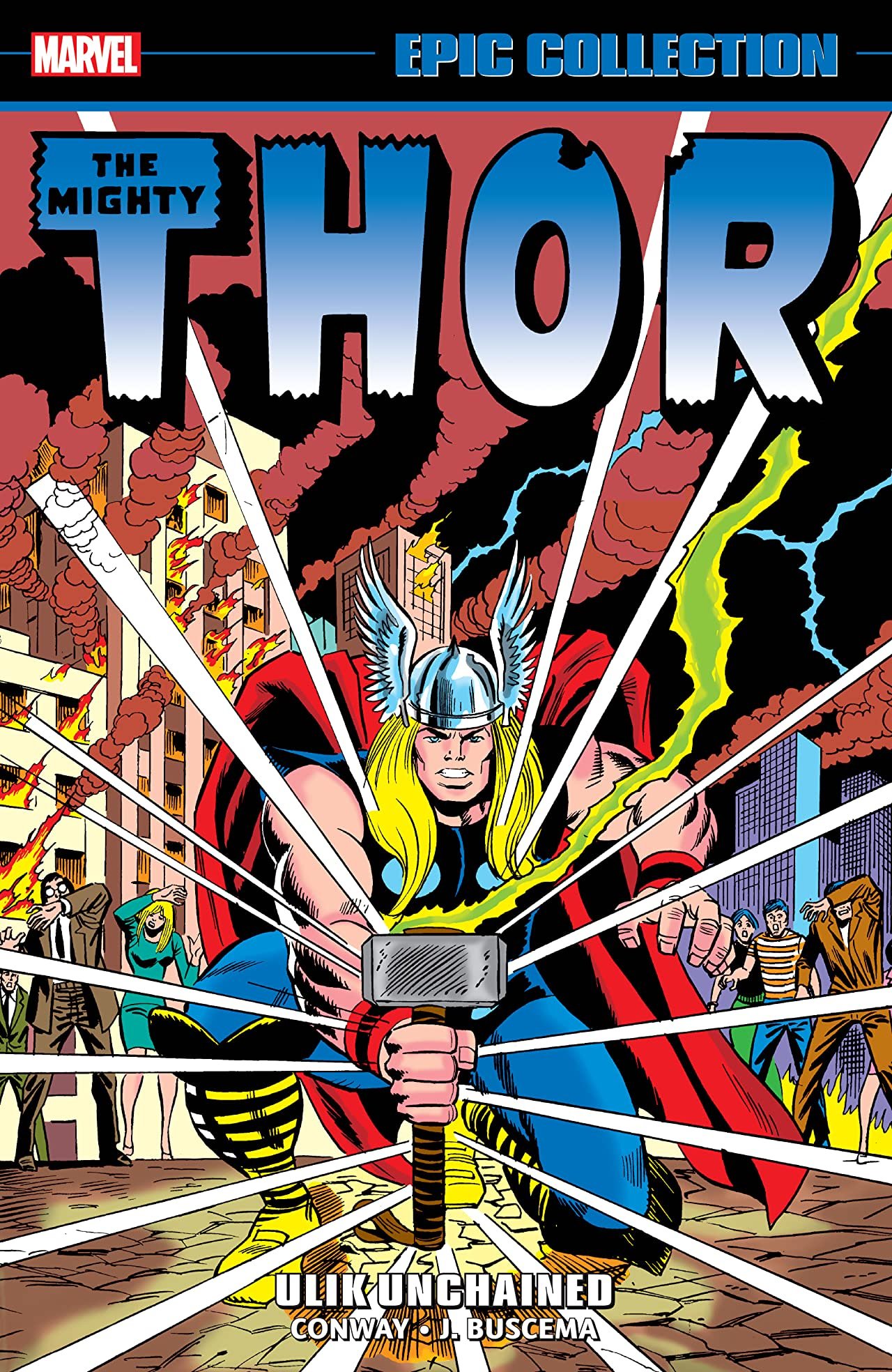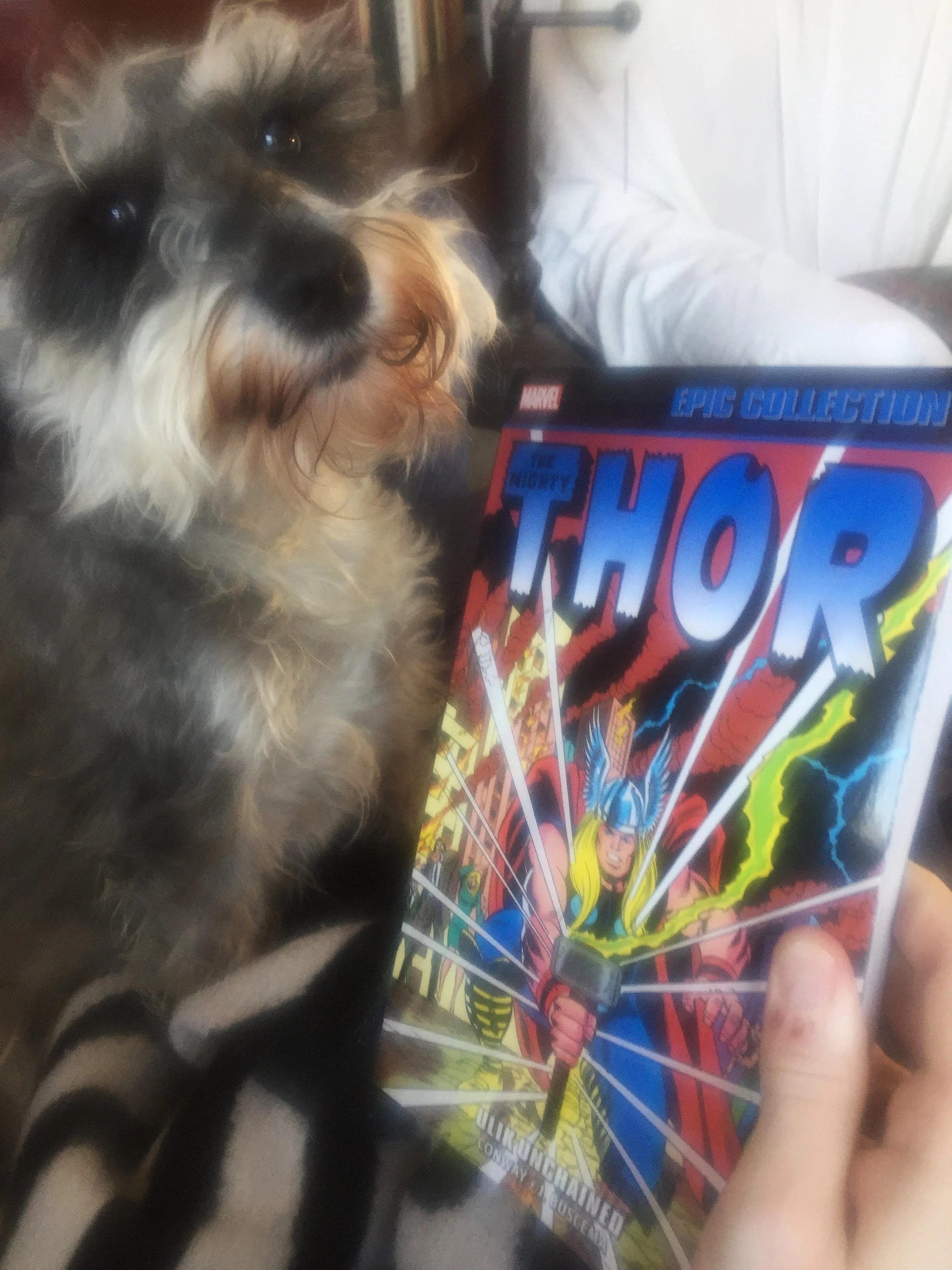Stevereads: Give the Lady What She Wants!
/A lively, colorful history of Marshall Field & Company!
Read MoreA lively, colorful history of Marshall Field & Company!
Read MoreA great lineup of writers in the New York Review of Books
Read MoreA military historian introduces a classic thriller
Read MoreA new Penguin Classic collects the writings of Alain Locke
Read More

Our book today is one of the newest entries in the “Epic Collection” series of full-color reprints from Marvel Comics: Ulik Unchained, the seventh volume featuring the mighty Thor, this one reprinting twenty issues running from 1973 to 1975, when Gerald Ford was US President and single comic book issues cost 25 cents each but sold in such quantities that their many artists, writers, colorers, and editors could earn a living wage, whereas now, fifty years later, individual comics cost $5 apiece and sell so poorly that their almost all-freelance staff lives in abject poverty.
A different time, and a different Thor. The character in these pages, so elegantly drawn by John Buscema, is noble (although a bit of whiney-pants - the ‘70s were big on characters feeling sorry for themselves), self-sacrificing, no-nonsense, and of course immensely powerful. That last is always tricky with this character: he exists in Marvel’s normal superhero universe of lower Manhattan, where you can qualify as a supervillain if you’ve got a pair of stilts or a pair of vibrating gloves, but he himself is the immortal Norse god of thunder, able to rip apart steel like tissue, summon ferocious storms at will, and draw on thousands of years of combat experience … a bit of an imbalance, then, if Thor goes up against the nefarious, um, Owl.

The writer of these issues, Gerry Conway, solves this problem by pitting Thor against immense, otherworldly foes. In these pages, he faces the titular Ulik the troll, a contingent of Asgardian warriors led by his half-brother Loki, the indestructible Destroyer, his good friend/sparring partner Hercules, the gods of ancient Egypt, the world-devouring Galactus, and Ego the Living Planet … there simply isn’t room to squeeze in the Circus of Crime.
These Epic Collections aren’t cheap – this one retails for $45 – but they’re in gorgeous full color (with discreet fixes to earlier printing errors, including re-paginating issue #231 to fix a problem with the original printing), and they save on shelf space; Ulik Unchained collects in one volume what the hardcover (and obscenely more expensive) Marvel Masterworks volumes needed two to cover.
Several things jumped out at me while re-reading this volume (because of course I bought it, even though I have those two obscenely-expensive Marvel Masterworks volumes, and even though I still have the original issues I bought from the dry goods store and read so lovingly through hot Iowa summers and slushy Iowa winters), including Conway’s weird decision to make Hercules, one of the mightiest characters in the Marvel universe, Thor’s ineffective sidekick for a dozen issues. He fights the new herald of Galactus, Firelord, until Thor steps in; he fights the Destroyer until Thor steps in; he fights a mutated beast-man until Thor steps in (Thor swoops in and says “I see thou art recovered” and Hercules quite rightly responds, “How can one recover when he never fell?”), but he hardly ever seems tempted to out-sine the Thunder God in his own book.

These were grand old issues, and they sparked many a heated debate in the letters columns, fifty years ago: should Thor ditch his winged helmet, as Hercules suggests (“Keep it, yes, but in the name of mercy, keep it in a dark place”)? Can Thor manipulate the movements of his hammer after he’s thrown it, or is it just a one-direction missile? Is it Thor’s human alter ego Donald Blake who’s in love with the nurse Jane Foster, or is it Thor? And if it’s Thor, isn’t he also in love with the goddess Sif? And more broadly, just what do the normal humans of this world think about Thor and his fellow Asgardians? In these issues, as mentioned, Asgardian warriors actually attack Earth, and one glum old general is contemplating using nuclear weapons against them – does the general public even know that Thor is essentially the one Earth-loving member of a warlike super-race that could show up on Washington’s doorstep at any moment? At one point in this collection – in another issue beautifully drawn by John Buscema matched with his ideal inker, Joe Sinnott – Thor stops some routine street criminals with negligent ease, and one of the awestruck cops inadvertently strikes the very note I was thinking about as I re-read these issues: “A guy with power like that could rip this city apart and not even end up breathing hard.”

It’s a neat note, but it isn’t sounded often in these stories, mainly because Conway keeps Thor busy offworld, fighting living planets, living skeletons, and an array of robots. The artwork in these issues is mostly by Buscema, inked very well by Sinnott and less well by Mike Esposito or Dick Giordano, and also a couple of issues penciled by Rich Buckler (with a backup Hercules story drawn by George Tuska), and there a dozens of great moments and great sequences. Despite the silly and poorly-crafted bits scattered throughout, it’s was a delight to revisit it all one more time.
You too can be pleasantly surprised by the odd choices and risky innovations so many writers make in the books on this list.
Read More2021 has given us some of the worst, most disgraceful books ever published in US history.
Read More2021 saw a bumper-crop of truly excellent fiction, possibly because lockdowns prevented writers from doing virtually anything else.
Read MoreRampant narcissism, shallow MFA programs, and poisonous social media were generous contributors to the worst fiction of 2021.
Read MoreIn spite of some significant obstacles, these impressive biographies were brought to life in 2021.
Read MoreThis is a place for all of my writing about books.